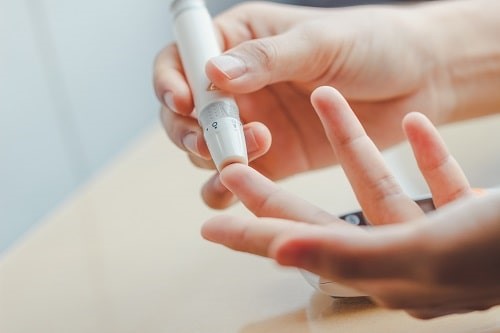Employers have a legal duty to manage risks to people’s health and safety arising from a worker suffering diabetes.
Features
Don’t overlook diabetes
Failure to identify and manage the risk from diabetes in the workplace could have criminal consequences.
Despite diabetes being one of the fastest growing health threats in the UK, many employers still fail to appreciate or meet their duty of care, either to employees who are sufferers or to those who could be affected by what those sufferers might do. As an invisible epidemic, diabetes is often not understood or taken as seriously as other conditions, as Kate Walker, CEO of the Diabetes Safety Organisation, detailed in her recent article for Safety Management.
 Andrew Litchfield: "Employers must think about how diabetes might impact on health and safety at work and take practical steps to deal with any risks that could emerge."
Andrew Litchfield: "Employers must think about how diabetes might impact on health and safety at work and take practical steps to deal with any risks that could emerge."
The Health and Safety at Work Act 1974 states that an employer must ensure, so far as is reasonably practicable, the health, safety and welfare at work of all their employees and those who could be affected by what the employer does. This article will explain those duties in more detail and identify the legal steps necessary to be compliant.
Diabetes: the challenges
There are three challenges regarding managing the potential health and safety risks arising from staff with diabetes in the workplace. These are:
- Despite increasing diagnosis, many people do not realise that they are suffering from the condition and therefore do not take any steps to manage it
- There remains a stigma around admitting to having the condition – both a fear of judgment about the sufferer’s lifestyle and fear of dismissal from work, and
- The symptoms can be both sudden, as in the case of a ‘hypo’ event – where the person’s blood sugar level falls too low, posing a risk of symptoms like blurred vision and feeling disorientated, which could pose a safety risk – and more gradual.
The legal duty on an employer is clear. They must ensure (i.e. make certain to happen), so far as is reasonably practicable, that both their employees, and those affected by the employer’s undertaking, are not exposed to risks to their safety, health or wellbeing.
That is a high burden, especially when viewed through the lens of an accident having occurred.
An employer must also undertake risk assessments to identify the risks which are generated by its activities, and put in place control measures to eliminate – or, if this is not possible, reduce as much as is reasonably practicable – those risks.
 The symptoms can be sudden, as in the case of a ‘hypo’ event – where the person’s blood sugar level falls too low. Photograph: iStock
The symptoms can be sudden, as in the case of a ‘hypo’ event – where the person’s blood sugar level falls too low. Photograph: iStock
Breach of either of those duties (and there are several others which could also apply), is a criminal offence. The sanction available to the court is an unlimited fine, which will not be covered by an employer’s insurance policy. In the worst cases, individuals may also commit criminal offences.
It is not possible for an employer to contract out the duty – for instance, by passing on the legal responsibility for managing the health and safety risks arising from their work activities to another person or organisation.
These duties are not specific to diabetes, but they certainly apply to the risks which arise in the workplace from the condition. This includes, for example, the possibility of a worker with diabetes suffering a hypo (hypoglycaemia) due to their low blood sugar level, and suffering blurred vision or feeling disorientated, which could pose a safety risk – for instance, when operating dangerous machinery.
Employers must therefore understand the condition, consider and apply their health and safety legal duties to it, think about how diabetes might impact on health and safety at work and take practical steps to deal with any risks that could emerge.
In practice, the following steps should be taken to address the challenges:
- Put in place a diabetes at work policy – this will give the issue a focus and set out how the condition will be addressed
- Incorporate diabetes risk into existing risk assessments – this will help to identify practical control measures, and
- Put in place the control measures. This will probably include a range of steps, from training and educating staff about the risk that diabetes could pose to health and safety at work, to requiring blood sugar testing before allowing a worker with diabetes to operate dangerous equipment.
The necessary steps will depend on the outcome of the risk assessment. The most effective way to discharge the legal duties set out in the Health and Safety at Work Act 1974 is to prevent an accident, injury or dangerous incident occurring in the first place. Diabetes must be taken seriously as a workplace risk and the appropriate risk identification and management steps must follow.
Andrew was one of the expert presenters in a recent webinar on managing the health and safety risks from diabetes at work, hosted by Being Well Together. The webinar was co-presented by Kate Walker, CEO of the Diabetes Safety Association. Being Well Together is a programme from the British Safety Council designed to help employers improve the health and wellbeing of their staff.
Listen to the recording at: bit.ly/3Bev9X8
Contact Andrew Litchfield here
Andrew Litchfield is Health and safety partner at Gowling WLG law firm
FEATURES

Underpinning safety training with neuroscience for long lasting impact
By SSE Active Training Team (ATT) on 30 November 2025
A behavioural safety training programme developed by Active Training Team for energy provider SSE has been carefully designed with neuroscientific principles in mind – resulting in a prestigious industry award for Best Training Initiative in 2024.

Why a painted line will never be enough
By UK Material Handling Association (UKMHA) on 20 November 2025
Businesses that operate material handling equipment like forklifts are being urged to submit accident and near miss details to a new confidential reporting portal so the industry can identify what needs to be done to improve safety standards.

Why workplace transport training is changing in 2026 and what it means for employers
By AITT on 14 January 2026
New workplace transport training categories due in January mean it is essential to ensure operators of material handling equipment have the necessary training for the exact type of machine they use, and accredited training providers are an ideal source of advice and conversion training.



